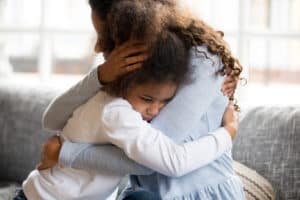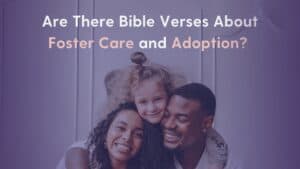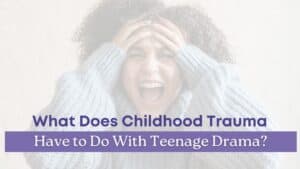When my husband and I first signed up to become foster parents, we had no idea what was in store for our family. We knew that children in our community were in hard places. They were hurting, and we felt called by God to open our home to them. As first-time parents, we believed that providing a child with love, structure, discipline, and Christian values would result in obedience and faithfulness. After all, my husband was a pastor, and we knew what the Bible said about training up a child in the way he should go.
Through the licensing process, we received training from professionals about what to expect. Children in foster care had experienced various forms of abuse and neglect that resulted in their removal from biological parents. As a result of what happened in their family, these kids might have big feelings and difficult behavior while in our care. Therapy, family visitation, team meetings, and court would become a part of our routine as we navigated the child welfare system. The best outcome for children in care was returning home safely. For some children, however, adoption would become the permanent plan when reunification was no longer in their best interest. Adopted children experienced grief and loss, and adoptive families needed to work to navigate issues of identity and belonging.
Life Was Chaotic and Complicated
As foster parents, our home filled quickly with children. Our first daughter came to our family as an infant. Six months later, we got the call to bring home our second daughter, who was fifteen. Soon after, we added a five and seven-year-old brother and sister to the mix. Then we got pregnant with our son. We completed four adoptions, celebrated the birth of a child, and watched our oldest daughter graduate within a year’s time frame. Life was chaotic and complicated, but we were so grateful that God had blessed us with each of our five children. We held out hope that in time things would settle down. But they didn’t.
Felt Like We Were Drowning
Less than a year after finalizing our adoptions, we felt like we were drowning. Despite teaching our children right from wrong, they didn’t seem to grasp our expectations. We valued honesty and hard work, but our children seemed to constantly lie to get out of doing household chores. Education was a priority, but our children hated reading and threw massive tantrums to avoid completing homework. We emphasized respect for authority, but our children rebelled against us and resisted our rules.
My husband and I couldn’t agree on how to discipline. We used rewards and punishments, time-outs, sticker charts, loss of privileges, spankings, groundings, and memorizing scripture. It seemed like no matter what we tried, our children’s behavior was worsening. We felt like failures as parents and wondered if God had really called us to foster care and adoption. Our relationships with our children and each other were deteriorating. We were embarrassed and ashamed because we had signed up for this, after all.

Children from Hard Places
Out of desperation, we reached out for post-adoption services. When Ms. Jennifer came to our home, she helped us feel safe enough to share our story. As an adoptive parent herself, she offered resources and support to validate our experience. She gave us the book The Connected Child . And sent us to a weekend conference called Hope for the Journey (formerly Empowered to Connect), where Dr. Karyn Purvis taught about Trust-Based Relational Intervention. Over and over, we saw our children reflected in the videos on children from hard places. No one else had told us about the long-term effects of trauma on children’s brains, behavior, and belief systems. We wept. If we had only known, we would have done things so differently.
Maya Angelou said, “Do the best you can until you know better. Then when you know better, do better.” Now that we knew better, we tried to do better. Right away, we started implementing the principles we learned in our home. Rather than insisting on obedience, we offered choices to empower our children to make good decisions. Instead of being spontaneous, we focused on predictability and advanced warning before transitions. We prioritized connecting with our children while correcting their behavior. We used playful engagement, co-regulation, re-dos, time-ins, and compromises instead of punishment.
A Shift in My Expectations
While I would love to tell you that these changes quickly resulted in a calm and happy home, that’s just not the case. Although better equipped to parent from a trauma-informed attachment-based approach, our life was still really hard. Dr. Purvis often said she had never met a child who couldn’t come to dramatic levels of healing, but I didn’t realize how much that healing would require of me. Parenting children from hard places required a fundamental shift in my expectations as a mother.
In response to our family’s experiences, I dedicated my career to helping families and children impacted by the trauma of abuse and neglect. After years of working within the child welfare system across multiple states and various agencies, I came to a sobering realization. No matter how many families I recruited, trained, and licensed to become foster and adoptive parents, countless more were losing their homes. Families felt isolated and overwhelmed trying to meet their children’s needs while managing behavior and were giving up the fight.
Offering Hope and Healing to Families
After completing TBRI® Practitioner Training at the Karyn Purvis Institute for Child Development, I founded the nonprofit organization Flourishing Families of South Carolina to offer hope and healing to families affected by childhood trauma. Flourishing Families provides TBRI® Caregiver Training and Family Coaching via small groups and personalized sessions designed to address the unique challenges within the family. Our vision is that foster, adoptive, and kinship families will flourish in connected communities empowered to help children from hard places prosper into healthy adults.

Since TBRI® teaches caregivers a specialized approach to meet the complex needs of vulnerable children, all our leaders have experience caring for children from hard places as well. Because we know that families often feel vulnerable asking for help, Flourishing Families prioritizes a nonjudgmental experience for all who engage with our services. From the person answering emails to the trainer and the in-home coach, we each can personally relate to the families and children we serve.
Reach Out for Help
If you have signed up for foster care or adoption, start learning now about trauma and attachment so you are equipped to help the children who will come into your home. If you have already brought home a hurting child and are losing hope, reach out for help. Those of us who have walked this road before will cheer you on to the finish line. Your child can indeed come to dramatic levels of healing. In the words of the TBRI Mantra: “Don’t quit. If not you, then who?”
















